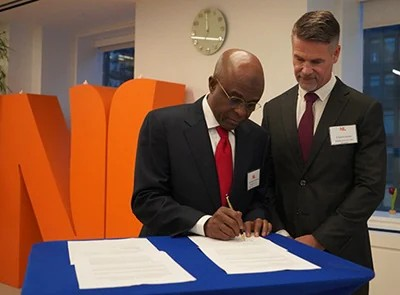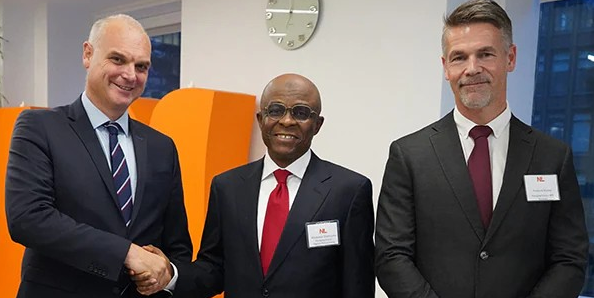
Dr. Abubakar Dantsoho, Managing Director, Nigerian Ports Authority, and Frederik Klinke, CEO of APM Terminals Nigeria. Photo credit: APM Terminals
APM Terminals’ West African Container Terminal (WACT) in Onne and the Nigerian Ports Authority have signed a memorandum of understanding to accelerate decarbonisation in Nigeria’s port and transport sector, according to the company’s release.
The agreement was formalised on September 22 at the Dutch Consulate in New York, during the week of the Global African Business Initiative.
The MoU establishes a roadmap for electrifying containerised freight, in line with the policies of the Federal Ministry of Marine and Blue Economy in the country.
“We believe that Nigeria is ideally situated to lead West Africa’s transition to low-carbon logistics by electrifying its container transport sector,” said Frederik Klinke, CEO of APM Terminals Nigeria. “Nigeria is Africa’s largest economy and trade hub, and our research shows us that the country can leapfrog fossil-fuel infrastructure and adopt proven electric technologies. We are therefore very optimistic about our joint plans to develop a phased roadmap towards an electrified future for container logistics”.
From his side, the managing director of the Nigerian Ports Authority Dr. Abubakar Dantsoho stated that the project -wholly funded by APM Terminals to the tune of USD$60m- could become a model for other African countries.
“By this development, the Onne Port will be the first green port in Nigeria and will thereby be promoting the decarbonisation efforts within the transportation ecosystem. This will also make Nigerian ports the leaders on the continent in terms of sustainable port operations.”
The agreement builds on a study APM Terminals presented at the Decarbonising Infrastructure in Nigeria Summit in Abuja in July.
The study concluded that moving from fossil fuels to electrified container freight could attract private investment, create skilled jobs, and deliver a more reliable energy supply.
It also stressed the need for coordination across sectors and cooperation between public and private partners.



